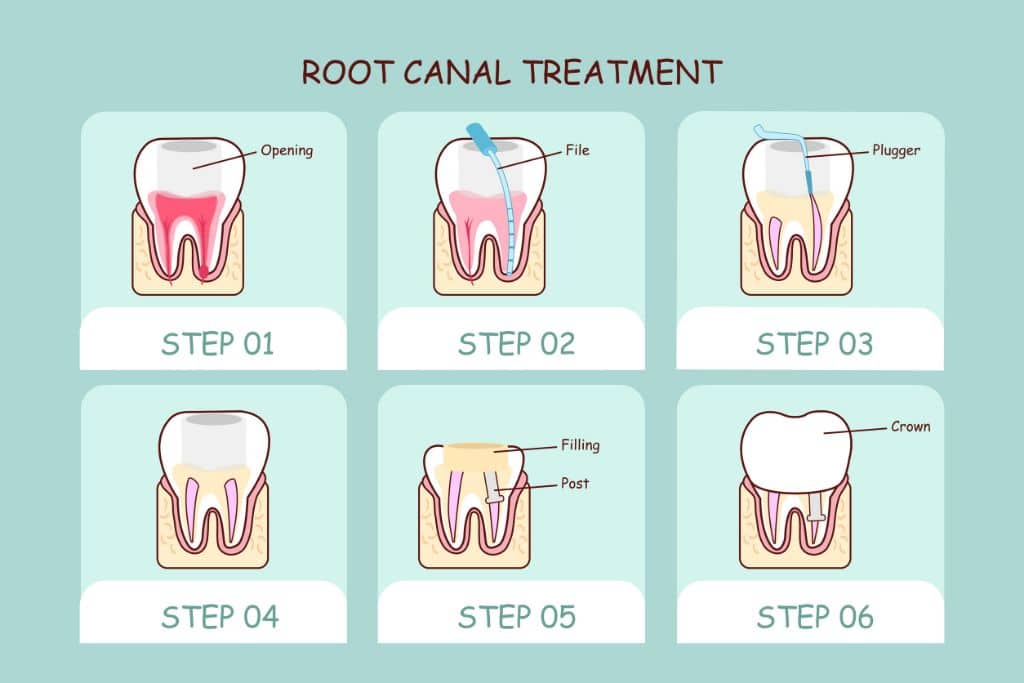Do Root canals cause cancer, according to various sources like the Canadian Cancer Society, National Institutes of Health, and dental experts like Dr. William Twohig. There is no scientific evidence to support the claim that root canals are linked to cancer.
Root canals involve removing infected or dead parts of a tooth and sealing off the cavity. While there may be minor risks associated with the procedure, such as post-treatment discomfort, root canals do not pose a cancer risk.

Myths And Misconceptions
When it comes to dental procedures, myths and misconceptions can often lead to confusion and concern. Root canals, in particular, have been surrounded by various rumors, especially regarding their alleged connection to cancer. It’s essential to address these misconceptions and separate fact from fiction to provide accurate information about the safety of root canal procedures. In this article, we’ll debunk the myths and shed light on the truth about root canals and their relation to cancer.
Rumors About Root Canals
Several rumors and misconceptions have perpetuated the belief that root canals may pose health risks, including a connection to cancer. These rumors often stem from misinformation and lack of scientific evidence, leading to unwarranted fear and skepticism surrounding the procedure. It’s crucial to address and dispel these rumors to provide clarity and alleviate concerns.
Connection To Cancer
Despite the prevalence of rumors suggesting a link between root canals and cancer, it’s important to emphasize that scientific research and reputable dental associations have refuted these claims. Numerous studies and experts in the field have conclusively confirmed that there is no evidence to support the notion that root canals cause or contribute to cancer development. Therefore, individuals considering or undergoing root canal therapy can rest assured that it does not pose a cancer risk.
Scientific Evidence
There is no scientific evidence supporting the idea that root canals cause cancer. While rumors and myths persist, multiple studies have shown that there is no connection between root canals and the development of cancer.
Absence Of Evidence
When it comes to the question of whether root canals cause cancer, it is important to examine the scientific evidence. The good news is that there is an overwhelming consensus among experts that root canals do not cause cancer. Numerous studies and research have been conducted to investigate any potential link between root canals and cancer, and the findings consistently indicate that there is no evidence to support such a connection.
The American Association of Endodontists, the leading professional organization for root canal specialists, states unequivocally that root canal therapy does not cause cancer. They emphasize that root canals are a safe and effective treatment for saving damaged or infected teeth, and they have been performed for decades with a high success rate.
Moreover, reputable sources such as Medical News Today and the Canadian Cancer Society confirm that there is no scientific evidence to suggest that root canals cause cancer. These organizations inform the public and debunk myths about cancer, and they stress the importance of relying on evidence-based information.
American Association Of Endodontists
The American Association of Endodontists (AAE) is a trusted authority in the field of root canals. They are dedicated to promoting the highest standards of root canal treatment and advocating for patient safety. According to the AAE, root canals have been thoroughly studied and researched, and there is no substantiated evidence linking them to the development of cancer.
The AAE emphasizes that root canals are a proven and well-established treatment for preserving natural teeth. They explain that during a root canal procedure, the infected or damaged pulp inside the tooth is removed, and the canals are thoroughly cleaned and sealed to prevent reinfection. This process eliminates the source of infection and preserves the tooth structure, allowing patients to maintain their natural smile and oral health.
In addition, the AAE highlights that root canal therapy is a standard treatment recommended by dental professionals worldwide. It is considered a safe and effective procedure, and millions of root canals are performed every year without any evidence of a cancer risk.
In conclusion, the scientific evidence overwhelmingly indicates that root canals do not cause cancer. Leading organizations such as the American Association of Endodontists emphasize that root canal therapy is safe and effective, providing patients with a long-term solution to save their natural teeth. It is important to rely on evidence-based information and consult with a qualified dental professional to address any concerns or questions regarding root canals and their potential health effects.
Potential Risks
Root canal treatment does not cause cancer; nonetheless, there are some minimal concerns. While rumors about the procedure being painful or leading to complications may cause people to avoid root canals, there is no evidence to support a connection between root canals and cancer.
Minor Risks Associated With Root Canal Therapy
While it is important to address any concerns regarding potential risks associated with root canal therapy, it is crucial to note that there is no evidence to support the claim that root canals cause cancer. However, like any medical procedure, root canal therapy does come with some minor risks that dental professionals and patients should be aware of.
1. Infection
One of the possible risks associated with root canal therapy is the risk of infection. During the procedure, the infected or dead tissue is removed from the tooth’s root canal. However, there is always a slight chance that some bacteria may remain, leading to an infection. Dentists take utmost precautions to minimize this risk by thoroughly cleaning and disinfecting the tooth’s root canal before sealing it.
2. Discomfort And Sensitivity
After undergoing a root canal, it is common to experience some discomfort and sensitivity in the treated tooth for a few days. This is a normal part of the healing process and can be managed with over-the-counter pain medication and by following your dentist’s post-treatment instructions.
3. Fracture
In some cases, root canal therapy can weaken the structure of the tooth, making it more prone to fractures. This risk is relatively low and can be minimized by restoring the tooth with a crown or filling after the root canal procedure. Using the tooth for biting hard objects or not maintaining proper oral hygiene can increase the risk of fracture.
4. Allergic Reactions
Although rare, some individuals may experience allergic reactions to the materials used during root canal therapy. These materials typically include rubber compounds and dental adhesives. If you have a history of allergies or are concerned about allergic reactions, it is important to discuss these concerns with your dentist before the procedure.
5. Post-treatment Discoloration
In some cases, a tooth that has undergone a root canal may experience discoloration over time. This occurs due to the removal of the tooth’s pulp, which contains vital nutrients and blood supply. However, this can be easily addressed through various cosmetic dental procedures, such as teeth whitening or dental bonding.
It is crucial to remember that the aforementioned risks associated with root canal therapy are generally minor and manageable. With advancements in dental technology and proper oral health care, the chances of experiencing these risks can be significantly reduced. Ultimately, it is essential to consult with your dentist to understand your specific situation and make informed decisions regarding your dental health.

Credit: www.drtwohig.com
Benefits Of Root Canals
Root canals are an essential dental procedure that provides multiple benefits including saving teeth and preventing infections. Many people have concerns about the potential risks associated with root canals, including the fear of cancer. However, it’s important to understand the numerous advantages of undergoing a root canal procedure.
Saving Teeth
Root canals are highly effective in saving damaged teeth, and preserving the natural structure and function of the tooth. By removing the infected pulp and sealing the root canal, this procedure can prevent tooth loss and eliminate the need for extraction.
Preventing Infections
Root canals play a crucial role in preventing the spread of infection within the tooth. By removing the infected tissue and disinfecting the canal, this procedure eliminates bacteria that can lead to severe tooth abscesses and further dental complications.

Credit: www.sarasotadentistry.com
Frequently Asked Questions On Do Root Canals Cause Cancer
Do Root Canals Cause Health Problems?
Root canal procedures do not cause cancer. Bacteria left behind during the procedure can cause health problems, but there’s no evidence linking it to cancer.
What Is Toxic About A Root Canal?
Root canals are not toxic, but the bacteria left behind during the procedure can cause health problems. Infection can lead to conditions like malaise, inflammation, and abscesses in the head or neck. However, there is no scientific evidence linking root canals to cancer.
Why Do People Avoid Root Canals?
People avoid root canals due to fear of pain and complications from the procedure. However, there is no evidence to suggest that root canals cause cancer or other health problems.
Is A Root Canal Life Threatening?
No, a root canal is not life-threatening. There is no scientific evidence linking root canals to cancer.
Conclusion
The connection between root canals and cancer lacks scientific evidence. The rumors and myths surrounding the harmful effects of root canals on health may cause unnecessary fear. It’s important to focus on reliable research and consult with dental professionals to make informed decisions about oral health.

I am a dentist and also blog regularly. my target audience is America Europe & providing regular information for them.
